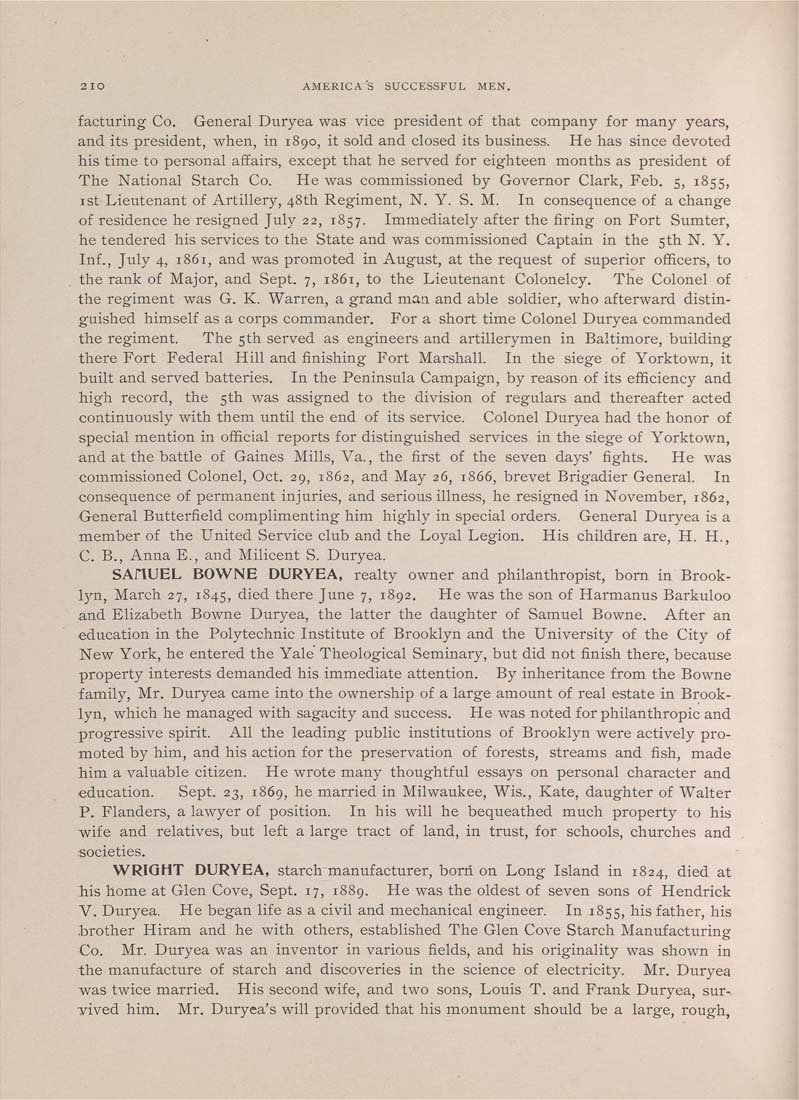2IO AMERICA'S SUCCESSFUL MEN.
facturing Co. General Duryea was vice president of that company for many years,
and its president, when, in 1890, it sold and closed its business. He has since devoted
his time to personal affairs, except that he served for eighteen months as president of
The National Starch Co. He was commissioned by Governor Clark, Feb. 5, 1855,
ist Lieutenant of Artillery, 48th Regiment, N. Y. S. M. In consequence of a change
of residence he resigned July 22, 1857. Immediately after the firing on Fort Sumter,
he tendered his services to the State and was commissioned Captain in the 5th N. Y.
Inf., July 4, 1861, and was promoted in August, at the request of superior officers, to
the rank of Major, and Sept. 7, 1861, to the Lieutenant Colonelcy. The Colonel of
the regiment was G. K. Warren, a grand man and able soldier, who afterward distin¬
guished himself as a corps commander. For a short time Colonel Duryea commanded
the regiment. The 5th served as engineers and artillerymen in Baltimore, building
there Fort Federal Hill and finishing Fort Marshall. In the siege of Yorktown, it
built and served batteries. In the Peninsula Campaign, by reason of its efficiency and
high record, the 5th was assigned to the division of regulars and thereafter acted
continuously with them until the end of its service. Colonel Duryea had the honor of
special mention in official reports for distinguished services in the siege of Yorktown,
and at the battle of Gaines Mills, Va., the first of the seven days' fights. He was
commissioned Colonel, Oct. 29, 1862, and May 26, 1866, brevet Brigadier General. In
consequence of permanent injuries, and serious illness, he resigned in November, 1862,
General Butterfield complimenting him highly in special orders. General Duryea is a
member of the United Service club and the Loyal Legion. His children are, H. H.,
C. B., Anna E., and Milicent S. Duryea.
SAflUEL BOWNE DURYEA, realty owner and philanthropist, born in Brook¬
lyn, March 27, 1845, died there June 7, 1892. He was the son of Harmanus Barkuloo
and Elizabeth Bowne Duryea, the latter the daughter of Samuel Bowne. After an
education in the Polytechnic Institute of Brooklyn and the University of the City of
New York, he entered the Yale Theological Seminary, but did not finish there, because
property interests demanded his immediate attention. By inheritance from the Bowne
family, Mr. Duryea came into the ownership of a large amount of real estate in Brook¬
lyn, which he managed with sagacity and success. He was noted for philanthropic and
progressive spirit. All the leading public institutions of Brooklyn were actively pro¬
moted by him, and his action for the preservation of forests, streams and fish, made
him a valuable citizen. He wrote many thoughtful essays on personal character and
education. Sept. 23, 1869, he married in Milwaukee, Wis., Kate, daughter of Walter
P. Flanders, a lawyer of position. In his will he bequeathed much property to his
wife and relatives, but left a large tract of land, in trust, for schools, churches and
.societies.
WRIGHT DURYEA, starch manufacturer, born on Long Island in 1824, died at
;his home at Glen Cove, Sept. 17, 1889. He was the oldest of seven sons of Hendrick
V. Duryea. He began life as a civil and mechanical engineer. In 1855, his father, his
brother Hiram and he with others, established The Glen Cove Starch Manufacturing
Co. Mr. Duryea was an inventor in various fields, and his originality was shown in
the manufacture of starch and discoveries in the science of electricity. Mr. Duryea
was twice married. His second wife, and two sons, Louis T. and Frank Duryea, sur-
-vived him. Mr. Duryea's will provided that his monument should be a large, rough,
|








